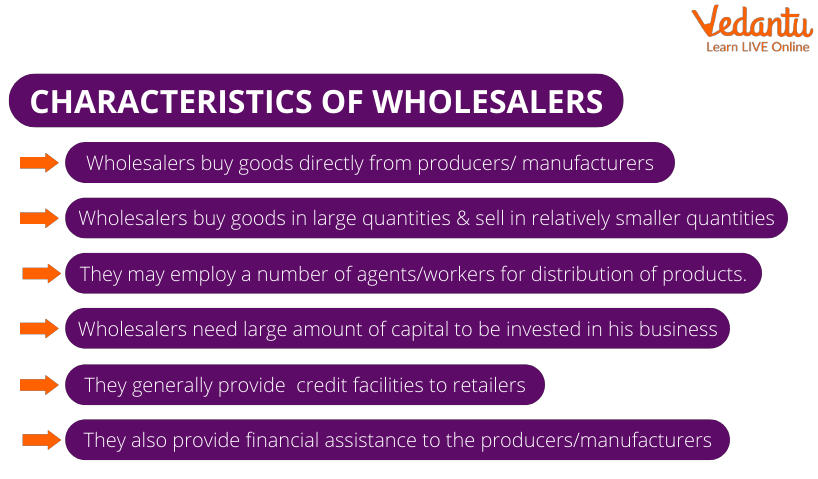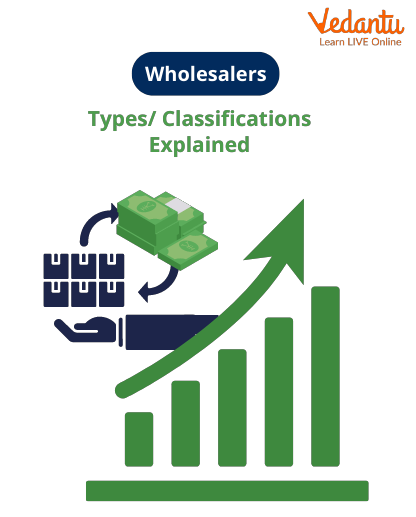




Before we understand the types of wholesalers, we should be aware of who a wholesaler actually is.
Who is the Wholesaler?
A distributor who provides merchandise to a retailer. Retailers can benefit from a lower price than if they were to purchase individual things when a wholesaler sells their product to them in large quantities. Although a reseller is another option, the wholesaler will often purchase items directly from the manufacturer. In either scenario, the wholesaler receives significant savings for purchasing a huge volume of items. Rarely does the distributor actually make a product; instead, they concentrate on distribution.
Characteristics of Wholesaler
Wholesalers have the following characteristics:
Wholesalers buy products from manufacturers or producers directly.
They buy products in bulk and dispense them in smaller quantities.
They provide various iterations of a particular range or product. A paper wholesaler, for example, must stock all types of paper, cardboard, and card.
Wholesalers may use a variety of representatives or employees to distribute their goods.
They invest in business products and demand a lot of funds.
They provide retailers with credit facilities.
They support the makers or producers financially by making mass purchases.
Wholesalers typically congregate in a single location. For instance, there are gur mandis (markets for sugar and related goods) and anaj mandis in numerous Indian towns (markets for food grains). Retailers can easily approach cloth or paper merchants because they are grouped together in one place.

Characteristics of Wholesalers
Importance of Wholesaler
Position of the Retailer in the Absence of the Wholesaler- We may come to appreciate someone's absolute necessity much more when they are not present and actively assisting us. This is true in the case of the wholesaler, who acts as a liaison between the manufacturer and the retailer.
Without a wholesaler, the retailer will face the following annoyances:
He will need to keep massive inventories of a wide range of goods, so he will need enough space and money to do so. Only a few retailers can command both capital and space.
He'll have to put together stocks from various manufacturers.
He will have to arrange for their transportation, packaging, and storage, among other things.
He will be vulnerable to price changes as well as shifts in public preferences and demand. Few shops are willing to take such a significant risk.
Types of Wholesaler
Wholesalers are classified into six types -
Merchants Who are Retailers
These are the most commonly used wholesalers in the private label, FMCG, and agricultural industries. Simply put, merchant wholesalers are individuals who buy products directly from manufacturers, store them, and then resell them to customers. They are not restricted to selling only to retail customers or only to online customers, and they can sell through any channel. Any losses incurred during the purchase and resale of the product must be borne by the merchant wholesaler.
Full-service Wholesalers in Retail are Wholesalers.
They are most commonly found in engineering or consumer durable products. Full-service wholesalers, as the name implies, provide complete service to the final retailer. These wholesalers, who primarily work in the retail sector, sell the products to a reseller (in this case, a retailer). Except for product service, the full-service wholesaler is in charge of everything.
Distributors of Limited Services
A limited service wholesaler is someone who supplies the company's products but only sells them through a specific channel. He doesn't cover all of the company's channels or has a low turnover rate.
Brokers and Agents
Most commonly observed in the chemical or real estate sectors. Brokers do not take any chances. He has the manufacturer or producer on one side and the customer on the other. The broker's job is to close the deal and earn a commission.
Small Offices and Divisions
Although there are various types of wholesalers, branches and small offices are traditional ways for businesses to start selling their products in a specific area. A branch is sometimes referred to as a type of wholesaling because it collects bulk orders from end customers and ensures supply as well as client reorders.
Specialized Wholesalers
These are wholesalers who specialize in a single product. A used car wholesaler, for example, may sell directly to consumers or to other used car dealers. He is an expert in used cars and is well-versed in all aspects of selling or restoring used vehicles to customers. Some wholesalers specialize in a specific product and are well-known for it.
Those mentioned above were among the various types of wholesalers in the market. As e-commerce sales increase, the demand for wholesalers in developing countries is decreasing.

Wholesaler and Its Classification
Case Study - Wholesaler
Alibaba.com
As we all know, Alibaba.com is one of the world's largest online marketplaces, with a diverse range of wholesale wholesalers. Customers will be able to purchase a wide range of goods. Remember that there are numerous quality and grade levels. The majority of wholesale providers have minimum order quantities (MOQs) that customers must meet. As a result of those set MOQs, prices will fall and become more affordable. Following that, deliveries to various locations around the world will be made, with suppliers opting for FOB shipping arrangements.
eBay
You are not an outlier; many people are familiar with eBay. eBay is a well-known large wholesale distributor in the United States. This online store can sell a wide variety of products. There are currently numerous brands of goods available. MOQs for some products are still available, but not for others. Despite the fact that you are purchasing in large quantities, this wholesale provider intends to be expensive. Some parts of the world will receive no shipments at all.
Amazon.com
Amazon.com is another significant wholesale distributor in the United States. It is considered for a variety of item supply. However, electronic goods and digital media, such as Amazon Prime, account for the vast majority of their sales. Customers can purchase items from Amazon's various warehouses located around the world. Depending on the customers' locations, a specific rate of shipment is generated both locally and internationally.
Conclusion
A wholesaler must have a license to sell to a retailer, and his goods are typically not offered to customers at the same price as they are to the retailer. This is done so that the retailer, who will mark up the amount paid to the wholesaler, can make a profit. If a customer purchases a product from a wholesaler, he will be charged for a drop shipment, which will be charged to both the buyer and the wholesaler.
FAQs on Wholesalers and Their Types: Explained
1. What is a wholesaler in the context of business?
A wholesaler is a type of business that buys large quantities of goods directly from manufacturers and then sells them in smaller batches to other businesses, such as retailers. They act as a crucial middleman in the distribution channel but do not typically sell directly to the final consumer.
2. What are the three main types of wholesalers?
The three major categories of wholesalers are:
- Merchant Wholesalers: These wholesalers buy the goods, take legal ownership (title), and then resell them. They bear the full risk of the inventory.
- Agents and Brokers: They act as intermediaries and facilitate the sale between a manufacturer and a buyer but do not take ownership of the goods themselves. They earn a commission for their services.
- Manufacturers' Sales Branches and Offices: These are owned and operated by the manufacturers themselves to handle the wholesaling of their own products, giving them more control over distribution.
3. How is a wholesaler different from a retailer?
The primary difference lies in their customers and the quantity of goods sold. A wholesaler sells goods in large volumes (bulk) to other businesses. In contrast, a retailer sells goods in small quantities directly to the end consumers for their personal use.
4. What key services does a wholesaler provide to manufacturers?
Wholesalers offer several valuable services to manufacturers, including:
- Facilitating Large-Scale Production: By placing bulk orders, wholesalers enable manufacturers to produce goods on a large scale.
- Bearing Risk: They take on risks related to price fluctuation, spoilage, and theft by purchasing and storing goods.
- Providing Market Information: Wholesalers are in close contact with retailers and can provide manufacturers with valuable feedback on customer demand and preferences.
- Financial Assistance: They often buy in cash or make prompt payments, helping with the manufacturer's cash flow.
5. What are the main benefits a retailer gets from working with a wholesaler?
Retailers benefit significantly from wholesalers. Key advantages include getting a variety of products from a single source, the convenience of buying smaller quantities, receiving credit facilities, and benefiting from the wholesaler's expertise on product trends and market conditions.
6. Why are wholesalers considered a vital link in the supply chain?
Wholesalers are vital because they create efficiency. It would be very impractical for every manufacturer to deal directly with thousands of small retailers. Wholesalers consolidate demand from many retailers and break down bulk supply from manufacturers, making the entire process of distributing goods from the factory to the local store much smoother and more cost-effective for everyone involved.
7. Can a business operate successfully without using a wholesaler?
Yes, it's possible. Some large retail chains, like Walmart or Big Bazaar, have enough purchasing power and logistical infrastructure to buy directly from manufacturers, effectively performing the wholesale function themselves. Similarly, many modern online brands (D2C or Direct-to-Consumer) sell their own products directly to customers, bypassing both wholesalers and traditional retailers.
8. What is the core difference between a merchant wholesaler and an agent wholesaler?
The main difference is ownership of goods. A merchant wholesaler (like a distributor) actually buys the inventory from the manufacturer. They own it and take on all the risks associated with it. An agent wholesaler (like a broker) never owns the goods; they simply act as a matchmaker to arrange the sale and earn a commission for their service.























